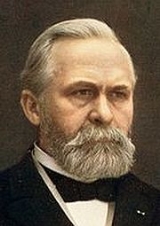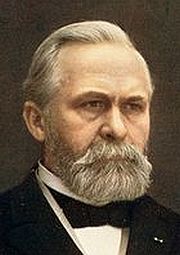
Wilhelm Julius Foerster
Encyclopedia

| Asteroid Asteroid Asteroids are a class of small Solar System bodies in orbit around the Sun. They have also been called planetoids, especially the larger ones... s discovered: 1 |
|---|
|-
| colspan="2" style="font-size: smaller;" |
- with Oskar LesserOskar LesserOtto Leberecht Lesser was a German astronomer who co-discovered asteroid 62 Erato with Wilhelm Julius Foerster on September 14, 1860 in Berlin. This was the first co-discovery on record....
|}
Wilhelm Julius Foerster (December 16, 1832 – January 18, 1921) was a German astronomer
Astronomer
An astronomer is a scientist who studies celestial bodies such as planets, stars and galaxies.Historically, astronomy was more concerned with the classification and description of phenomena in the sky, while astrophysics attempted to explain these phenomena and the differences between them using...
, father of the pacifist and ethicist Friedrich Wilhelm Foerster. His name can also be written Förster, but is usually written "Foerster" even in most German sources where 'ö' is otherwise used in the text.
A native of Grünberg
Zielona Góra
Zielona Góra is a city in Lubusz Voivodeship, in western Poland, with 117,557 inhabitants within the city limits and 294,000 inhabitants within the metropolitan area, including three neighbouring counties ....
, Silesia
Silesia
Silesia is a historical region of Central Europe located mostly in Poland, with smaller parts also in the Czech Republic, and Germany.Silesia is rich in mineral and natural resources, and includes several important industrial areas. Silesia's largest city and historical capital is Wrocław...
, he worked as Johann Franz Encke
Johann Franz Encke
Johann Franz Encke was a German astronomer. Among his activities, he worked on the calculation of the periods of comets and asteroids, measured the distance from the earth to the sun, and made observations on the planet Saturn.-Biography:Encke was born in Hamburg, where his father was a...
's assistant. After Encke's death in 1865, he became director of the Berlin Observatory
Berlin Observatory
The Berlin Observatory is a series of observatories and related organizations in and around the city of Berlin in Germany, starting from the 18th century...
until 1903.
He co-discovered asteroid
Asteroid
Asteroids are a class of small Solar System bodies in orbit around the Sun. They have also been called planetoids, especially the larger ones...
62 Erato
62 Erato
62 Erato is a large and dark, probably carbonaceous Themistian asteroid.Erato is the first asteroid to have been credited with co-discoverers, Oskar Lesser and Wilhelm Forster, who discovered it on September 14, 1860 from the Berlin Observatory. It was their first and only asteroid discovery...
with Oskar Lesser
Oskar Lesser
Otto Leberecht Lesser was a German astronomer who co-discovered asteroid 62 Erato with Wilhelm Julius Foerster on September 14, 1860 in Berlin. This was the first co-discovery on record....
, the first co-discovery on record. The asteroid 6771 Foerster
6771 Foerster
6771 Foerster is a main-belt asteroid discovered on March 9, 1986 by C.-I. Lagerkvist at Siding Spring.- External links :*...
is named after him, and so is the Wilhelm Foerster Sternwarte (William Foerster Observatory; IAU code 544).
He participated in the German Society for Ethical Culture (GSEC) (Deutschen Gesellschaft für ethische Kultur) (in which Albert Einstein
Albert Einstein
Albert Einstein was a German-born theoretical physicist who developed the theory of general relativity, effecting a revolution in physics. For this achievement, Einstein is often regarded as the father of modern physics and one of the most prolific intellects in human history...
also participated) and the German Peace Society
German Peace Society
The German Peace Society was founded in 1892. It still exists and is known as the Deutsche Friedensgesellschaft - Vereinigte KriegsdienstgegnerInnen...
(Deutsche Friedensgesellschaft), and resisted the rise in nationalism brought about by the outbreak of World War I
World War I
World War I , which was predominantly called the World War or the Great War from its occurrence until 1939, and the First World War or World War I thereafter, was a major war centred in Europe that began on 28 July 1914 and lasted until 11 November 1918...
.
When 93 German intellectuals signed the Aufruf an die Kulturwelt manifesto in support of the war, Foerster was one of only four intellectuals to sign the Aufruf an die Europäer counter-manifesto (the others were Albert Einstein
Albert Einstein
Albert Einstein was a German-born theoretical physicist who developed the theory of general relativity, effecting a revolution in physics. For this achievement, Einstein is often regarded as the father of modern physics and one of the most prolific intellects in human history...
, the philosopher Otto Buek
Otto Buek
Otto Buek was a German philosopher and translator born in St. Petersburg.He studied philosophy, chemistry and mathematics at the University of Heidelberg, and obtained his doctorate from the University of Marburg. Later he worked as a journalist in Berlin, where he translated works of Tolstoy,...
, and its author, the physiologist Georg Friedrich Nicolai
Georg Friedrich Nicolai
Georg Friedrich Nicolai was a German physiologist who studied at the University of Berlin, and later practiced medicine at the Charité in Berlin...
).
His son Friedrich Wilhelm Foerster also participated in the GSEC, along with Georg von Gizycki.

